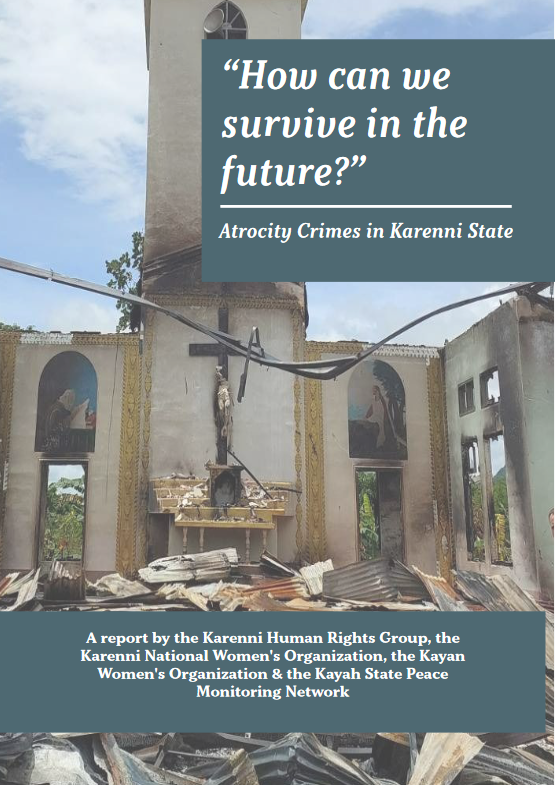“How can we survive in the future?”: Atrocity Crimes in Karenni State
07 February 2023


Executive Summary
Following the attempted coup on 1 February 2021, thousands of Karenni people participated in the peaceful mass protest movement against military rule that spread across the country. After the regime’s brutal crackdown and killings of peaceful protestors, young people in Karenni State set up barricades and roadblocks and took up arms to defend themselves. Some joined the Karenni Nationalities Defense Forces, while others joined local Peoples Defense Forces groups.
Since May 2021 the junta has attempted to exert control over Karenni State through rapid militarization. Military reinforcements are routinely deployed across townships in Karenni State and neighboring areas. At the same time, the Burmese military has ruthlessly employed its counter-insurgency strategy known as the “four cuts.” This deliberately targets civilians, viewing them as the support base for armed resistance groups, and aims to cut off access to four essentials: food, funds, intelligence, and recruits.
As part of its collective punishment strategy, the Burmese military has occupied villages across Karenni State, razing civilian infrastructure, setting up temporary outposts, and planting landmines around villages. When soldiers from the Burmese military retreat from a village, they typically burn down civilian homes.
The first part of this report documents serious violations of international human rights and international humanitarian law. These include both indiscriminate and targeted attacks on Karenni civilian populations, murder and mass killings, widespread destruction of civilian property, forced displacement on a massive scale, arbitrary arrest and detention, torture and cruel treatment, sexual violence, and using Karenni civilians as forced labor and human shields.
It also describes the humanitarian crisis facing at least 180,000 Karenni internally displaced people (IDPs). More than 40 percent of the estimated total Karenni population has been forcibly displaced, the vast majority of them women and children. The five townships of Loikaw, Hpruso, Shadaw, Deemaw Soe and Pekhon have been almost entirely abandoned. Already traumatized by the violations they have experienced, IDPs live in constant fear of renewed attacks by junta forces. Many IDPs have been displaced multiple times. Junta forces continue their assaults on Karenni towns, villages, and IDP sites unabated. In many cases, IDPs’ homes have been destroyed and they have nowhere to return to. The uncertainties they face about the future are paralyzing as they struggle to maintain hope.
The second part of this report contextualizes its findings with legal analysis. In summary, it is reasonable to conclude that members of the Burmese military have committed the war crimes of attacking civilians, attacking protected objects, pillaging, murder, torture, cruel treatment and displacing civilians in Karenni State. The conduct of the Burmese military likely also constitutes the crimes against humanity of imprisonment or arbitrary deprivation of liberty, murder, torture, enslavement, other inhumane acts, and forced displacement when considered in the context of a widespread or systematic ‘attack’ against the civilian population in Burma, committed with the requisite knowledge of the attack.
The Burmese military can commit these atrocity crimes with impunity because the international community does not hold them accountable, even though it has a legal and moral obligation to do so. A series of important steps must be taken to ensure that individual perpetrators from the Burmese military are held accountable. This includes referral of the situation in Burma to the International Criminal Court, which provides a pathway to justice and reparations for the thousands of victims. Without justice and accountability, there can be no lasting peace for Karenni communities.
This report also urges the international community to take action beyond mere ‘statement diplomacy’ to protect the thousands of civilians who live with the daily threat of being murdered by the military regime. This should include imposing a coordinated global arms embargo on the Burmese military and sanctioning aviation fuel supply in a bid to end deadly airstrikes on civilian populations.
View the original
Announcements
21 May 2025
Open letter: Malaysia must lead ASEAN with principle, not hypocrisy, to address the Myanmar crisis

Progressive Voice is a participatory rights-based policy research and advocacy organization rooted in civil society, that maintains strong networks and relationships with grassroots organizations and community-based organizations throughout Myanmar. It acts as a bridge to the international community and international policymakers by amplifying voices from the ground, and advocating for a rights-based policy narrative.